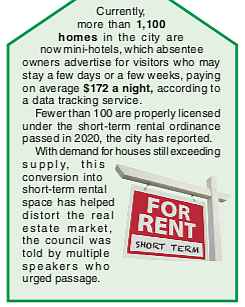Council changes housing zoning policies
Jeremy M. Lazarus | 9/28/2023, 6 p.m.
Richmond is taking a swing at boosting the supply of housing in hopes of stabilizing the soaring costs that are making it hugely expensive to rent or own.
On Monday, City Council revamped two zoning policies to make that happen, capping a three-year effort to overhaul the policies.
First, the members of the governing body approved an ordinance to make it easier for people to build a small housing unit in their backyard or install one in a basement, attach one to their home or add one to a garage. Such dwellings, which can be rented or used to house parents or other family members, are also called accessory dwelling units, or ADUs.
Seeking to encourage such development, the council approved a measure that would end the need of homeowners to get special permission from the council to develop an ADU and instead allow any owner of a home the right to do it.
It has been commonplace in The Fan where many former carriage houses and garages are now rental quarters, but uncommon in much of the city. The hope is that the change will lead more people to replace lawns with ADUs.
“It’s something I’ve been talking about for four years,” said 1st District Councilman Andreas D. Addison.
While Mr. Addison doesn’t think it will lead to a tiny home boom, he sees the legislation opening the door to more home building on existing sites.
Secondly, the council approved the overhaul of the 2020 ordinance governing short-term rentals in a bid to halt the practice of investors buying up homes and turning them into Airbnbs.
The new law strengthens the requirement that a home in a residential zoning district must be owner-occupied for a major part of the year and the principal residence of the person who is advertising a room or the house for rent. The requirement states that that regulation does not apply to short-term rentals built in business districts.
The ordinance also seeks to make it harder for people engaged in the short-term rental business to evade city licensing requirements. Third District Councilwoman Ann-Frances Lambert earlier this month acknowledged to the Planning Commission that she had not abided by licensing rules in offering a short-term rental.







